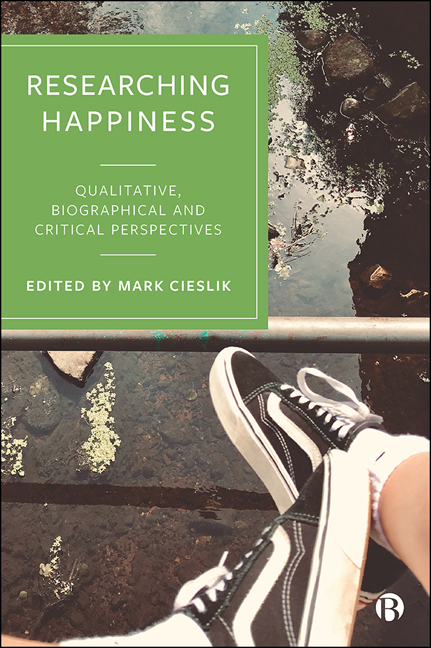Book contents
- Frontmatter
- Contents
- List of Figures and Tables
- Notes on Authors
- 1 Introduction: Developing Qualitative Research into Happiness and Wellbeing
- Part I Qualitative Research into Happiness/Wellbeing: Theories, Debates and Issues
- Part II Qualitative Research into Happiness/Wellbeing: Communities, Biographies and Identities
- Part III Qualitative Research into Happiness/Wellbeing: Methodological Innovations
- Index
4 - Personal Happiness, Social Unhappiness: Understanding the Complexity of Individual Happiness Accounts
Published online by Cambridge University Press: 22 December 2021
- Frontmatter
- Contents
- List of Figures and Tables
- Notes on Authors
- 1 Introduction: Developing Qualitative Research into Happiness and Wellbeing
- Part I Qualitative Research into Happiness/Wellbeing: Theories, Debates and Issues
- Part II Qualitative Research into Happiness/Wellbeing: Communities, Biographies and Identities
- Part III Qualitative Research into Happiness/Wellbeing: Methodological Innovations
- Index
Summary
Introduction
This chapter introduces the Mass Observation archive, its participant panel and its significance for qualitative happiness research. I outline key themes that emerge from my research before focusing on one significant finding: how disaffection with socio-economic conditions, political structures and ‘selfish’ social norms are embedded in happiness narratives. This was an unexpected finding, partly because the panel participants were not prompted to include a social dimension in their responses and also because in survey research individual (un)happiness is assumed to relate to an evaluation of personal wellbeing domains rather than wider social concerns (Thin, 2012; Pavot and Diener, 2013).
I situate this social dimension of happiness narratives in the context of political and sociological theories around democratic deficit and political disengagement in the UK (Norris and Inglehart, 2016; Curtice, 2018;). I also employ concepts of moral sentiment and lay normativity (Haidt, 2003; Sayer 2004; Smith, 2009) that view individuals as socially situated and sensitive to others’ wellbeing as well as their own. I conclude with two considerations for future happiness research: first, the need to understand the interrelationship of societal and individual happiness and, second, the challenge of developing methodologies that can interrogate lay perceptions of happiness/wellbeing.
What is Mass Observation?
The Mass Observation Project represents ‘a key national, qualitative, secondary data resource’ (Lindsey and Bulloch, 2014: 3). Originally established in 1937, Mass Observation (relaunched as the Mass Observation Project in 1981) aims to provide a record of everyday life by eliciting written accounts about a diverse range of topics from ordinary people to gain access to the thoughts, feelings and behaviours of non-official voices in the UK. As a ‘publicly available data set’ (Dale, 1988: 7) the Mass Observation archive, owned by the University of Sussex, constitutes one of ‘the major repositories of longitudinal qualitative social data for the UK’ (Casey et al, 2014: 1).
Three-times-a-year ‘Seasonal Directives’ on a variety of topics are sent to a volunteer participant panel resident in the UK. These directives constitute a set of open questions that invite participants ‘to write freely and discursively about their views and experiences on a range of subjects’ (Casey et al, 2014: 1).
- Type
- Chapter
- Information
- Researching HappinessQualitative, Biographical and Critical Perspectives, pp. 69 - 90Publisher: Bristol University PressPrint publication year: 2021

